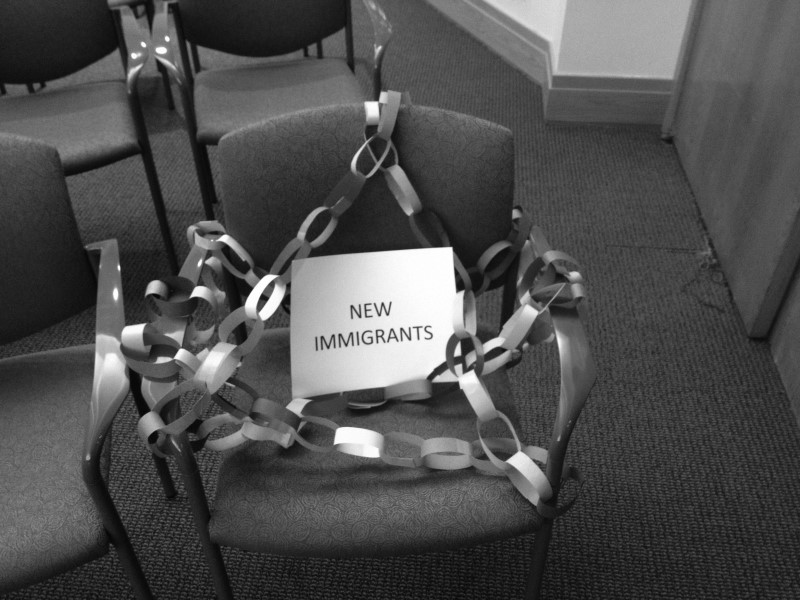The stranger is me
Parashiyot Yitro & Mishpatim
Recently we finished the Book of Genesis in our cycle of weekly Torah portions and began studying the Book of Exodus.
The Book of Genesis told us stories of our patriarchs and matriarchs; we learned about our ancestors, the beginning of the Israelites and how our people came to be living in the Land of Egypt.
The Book of Exodus teaches us about the enslavement of the Israelites when “A new king arose over Egypt who did not know Joseph.” (Exodus 1:8) Being enslaved in the Land of Egypt is a cornerstone of our people’s narrative. This story allows us to be open to God’s saving and redemptive powers. It provides us with the opportunity to learn how to come together and coalesce into one strong people with free choice. Our experience of oppression provides us with the empathy and compassion to deal humanely with others who find themselves in similar situations.
We have experienced the chen v’chesed, the mercy and loving kindness of God, and so we are more able to offer it to others. In fact, the Hebrew Bible repeatedly commands us to open our hearts to the stranger because we know what it was like to not be welcomed.
“You shall not oppress a stranger, for you know the feelings of the stranger, having yourselves been strangers in the Land of Egypt.” (Exodus 23:9)
“When a stranger resides with you in your land, you shall not wrong him. The stranger who resides with you shall be to you as one of your citizens; you shall love him as yourself, for you were strangers in the land of Egypt: I the Lord am your God.” (Leviticus 19:33-34)
These are only two of the many times our Hebrew Bible commands us to remember the experience of being a stranger.
The following excerpt comes from a d’var Torah on the Torah portion, Mishpatim, written by Rabbi Jonathan Sacks, a modern Orthodox Jew who served as the Chief Rabbi of the United Hebrew Congregations of the Commonwealth for 22 years. This teaching can be found in its entirety at http://rabbisacks.org/covenant-conversation-5768-mishpatim-
loving-the-stranger/
“Why should you not hate the stranger? – asks the Torah. Because you once stood where he stands now. You know the heart of the stranger because you were once a stranger in the land of Egypt. If you are human, so is he. If he is less than human, so are you. You must fight the hatred in your heart as I once fought the greatest ruler and the strongest empire in the ancient world on your behalf. I made you into the world’s archetypal strangers so that you would fight for the rights of strangers – for your own and those of others, wherever they are, whoever they are, whatever the colour of their skin or the nature of their culture, because though they are not in your image – says G-d – they are nonetheless in Mine. There is only one reply strong enough to answer the question: Why should I not hate the stranger? Because the stranger is me.”
Jews know what it is like to be treated inhumanely by people who have looked upon us as “other.” Time and time again throughout our history, we have overcome oppressive forces with the help of God, the strength and might of our will and determination, and the humane treatment that some have been willing to offer to people different from themselves.
In a very similar way, our American tradition teaches us the same lesson. There have been moments in our history when America has been afraid and closed our doors to those most in need of help and safe refuge. As Jews we know that only too well. How many Jews would have survived the Holocaust if America’s doors had been more open in the 1930s and 1940s?
Today, once again, our country is faced with making crucial decisions about how willing we are to open our hearts and welcome the stranger. Drawing upon our tradition of leaving an empty seat at the Passover Seder table for the Prophet Elijah to come and help us usher in an era of peace and understanding, we at Temple Habonim have begun to leave one seat empty in the front row of our sanctuary. We have placed a sign on it saying “New Immigrants” as a reminder of our command to welcome the “other.” This past week some of our madrichim, our high school students who come back and help with the younger students in our religious school, decorated the chair with paper chains so it would look inviting and welcoming for anyone who needs it and wants a safe place to rest.
As always, we look to the ancient wisdom of our Torah to help us inform decisions we make today.
Shabbat Shalom.
ANDREW KLEIN is rabbi of Temple Habonim in Barrington.











